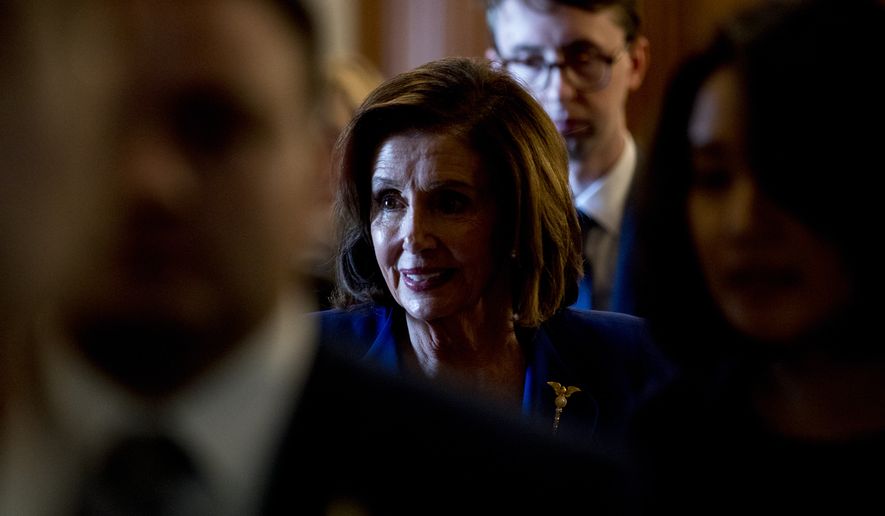House Speaker Nancy Pelosi and some of her top chairmen outlined the Democratic priorities for a phase four coronavirus package on Monday, but she said she won’t rush to push the bill through.
Mrs. Pelosi, California Democrat, said she doesn’t expect the package to be ready until after Easter and Passover. However, lawmakers are working on the package remotely so it will ready for a vote when Congress returns.
“All three of our bills have been bipartisan and we would want this one to be so as well,” she said. “So right now we’re collecting information, taking inventory — what are the actual needs.”
House Minority Leader Kevin McCarthy said last week he wanted Congress to hold off on pushing through any more major coronavirus packages until the first three bills had a chance to have an effect. Phase one cost $8.3 billion, followed by a nearly $105 billion phase two package, and then last week’s $2.2 trillion phase three.
But Democrats already have a long list of issues they want to tackle.
One of their top priorities is shoring up Occupational Safety and Health Administration (OSHA) protections for workers on the front line fighting the coronavirus or ensuring essential businesses keep running.
House Education and Labor Committee Chairman Rep. Bobby Scott of Virginia will take the lead on that portion of the package. He said the bill would include a measure to have OSHA issue a temporary emergency standard within seven days to require employers to craft new protections for affected employees.
Democrats also want to expand the types of workers covered under emergency OSHA protections, including grocers and Transportation Security Administration employees.
“Legislation is required. It’s been blocked three times. If we fail to act, it will make the situation more dangerous,” Mrs. Pelosi said. “Rather than call them our heroes, rather than just thank them, we have to protect them.”
Mrs. Pelosi wants the package to also consider how Americans and the economy will recover from the virus, with a focus on infrastructure, specifically broadband access and water resources.
“There are infrastructure needs that our country has that directly relate to how we are proceeding with the coronavirus. Many more people are teleworking, or tele-educating or really communicating with family and friends,” Mrs. Pelosi said.
Democrats also want to undo a part of the phase three bill that was signed into law last week that categorized D.C. as a territory, a move Mrs. Pelosi described as “discriminatory.”
“It has always been treated like a state,” she said. “And in the course of that, they lost several hundred million dollars in funding because of the way it was treated.”
Democrats also want to expand on funds to state and local governments; paid family and medical leave; direct payments to the American public; and provide free treatment for coronavirus rather than just free testing.
While lawmakers and their staffs can craft legislation remotely, members of Congress are still trying to weigh the health risks of reconvening to vote.
The phase three package was passed via voice vote on Friday, but most House members needed to return to the Capitol at the last minute to ensure the legislation wasn’t derailed by a procedural motion.
Rep. Thomas Massie, Kentucky Republican, attempted to force a full roll call vote on the $2.2 trillion package so lawmakers were on record about the bill.
“The problem with the whole scheme they had [was] if you allow Nancy Pelosi to pass bills with nobody there, the fourth version of this bill — she said the third one is just a downpayment — the fourth coronavirus bill will be insane and she’ll get to stick anything she wants in there,” Mr. Massie said on Fox Business Monday. “So we had to set a precedent that members are going to be there if they are going to have the vote.”
Mrs. Pelosi said leadership is still looking over new policies, but remote voting is off the table for the foreseeable future.
“Let’s not waste time on something that’s not going to happen,” she said.
A handful of House members have tested positive for the coronavirus in recent weeks, and several more have gone into self-quarantine after experiencing symptoms or being exposed to someone who tested positive.
Most recently, Rep. Nydia Velázquez of New York announced Monday she was diagnosed with a “presumed coronavirus infection” over the weekend. She was at Friday’s vote.
The House is out of session until at least April 20 to mitigate the risk of spreading the virus among lawmakers during votes or travel to Washington.
• Gabriella Muñoz can be reached at gmunoz@washingtontimes.com.




Please read our comment policy before commenting.